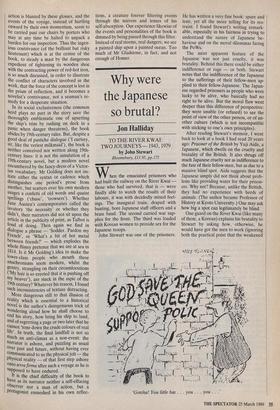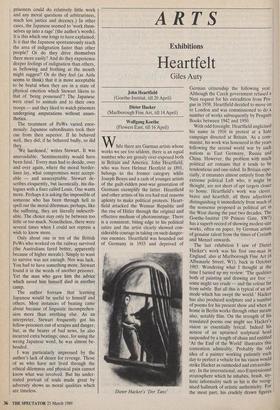Why were the Japanese so brutal?
Jon Halliday
TO THE RIVER KWAI: TWO JOURNEYS— 1943,1979 by John Stewart
Bloomsbury, £13.95, pp.175
When the emaciated prisoners who had built the railway on the River Kwai — those who had survived, that is — were finally able to watch the results of their labours, it was with decidedly mixed feel- ings. The inaugural train, draped with bunting, bore Japanese staff officers and a brass band. The second carried war sup- plies for the front. The third was loaded with Korean women to provide sex for the Japanese troops. John Stewart was one of the prisoners. He has written a very fine book: spare and lean, yet all the more telling for its res- traint. I found Stewart's writing remark- able, especially in his fairness in trying to understand the nature of Japanese be- haviour and on the moral dilemmas facing the PoWs.
The most apparent feature of the Japanese was not just cruelty, it was brutality. Behind this there could be either indifference or rage — or both. Stewart notes that the indifference of the Japanese to the sufferings of their fellow-men ap- plied to their fellow-Japanese. The Japan- ese regarded prisoners as people who were lucky to be alive, who basically had no right to be alive. But the moral flaw went deeper than this difference of perspective: they were unable (or refused) to see the point of view of the other person, or of an- other culture (which is not incompatible with sticking to one's own principles).
After reading Stewart's memoir, I went back to look at a book I had read 20 years ago: Prisoner of the British by Yuji Aida, a Japanese, which dwells on the cruelty and brutality of the British. It also shrugs off much Japanese cruelty not as indifference to the fate of their fellow-men, but as due to a massive blind spot. Aida suggests that the Japanese simply did not think about prob- lems like providing water for their prison- ers. Why not? Because, unlike the British, they had no experience with herds of animals. (The author became Professor of History at Kyoto University.) One may ask how big a spot can legitimately be blind.
One guard on the River Kwai (like many of them, a Korean) explains his brutality to Stewart by asking how, otherwise, he would have got the men to work (ignoring both the practical point that the weakened `Gotcha! You little bas. . . you. . . you. . prisoners could do relatively little work and any moral questions of arbitrariness, much less justice and decency.) In other cases, the Japanese seemed to 'work them- selves up into a rage' (the author's words). It is this which one longs to have explained. Is it that the Japanese spontaneously reach the area of indignation faster than other people? Or do they drive themselves there more easily? And do they experience deeper feelings of indignation than others, as bellowing and frothing at the mouth might suggest? Or do they feel (as Aida seems to think) that it is more acceptable to be brutal when they are in a state of physical emotion which Stewart likens to that of 'being possessed'? The Japanese were cruel to animals and to their own troops — and they liked to watch prisoners undergoing amputations without anaes- thetics.
The treatment of PoWs varied enor- mously: Japanese subordinates took their cue from their superior. If he behaved well, they did; if he behaved badly, so did they. 'We hardened,' writes Stewart. It was unavoidable: 'Sentimentality would have been fatal.' Every man had to decide, over and over again, where the moral border- lines lay, what compromises were accept- able — and unacceptable. Stewart de- scribes eloquently, but laconically, his dia- logues with a fixer called Louis. One wants more. Perhaps it is asking the impossible of someone who has been through hell to spell out the moral dilemmas; perhaps, like the suffering, they are literally indescrib- able. The choice may only be between too little or too much. Nonetheless, there were several times when I could not repress a wish to know more.
Only about one in ten of the British PoWs who worked on the railway survived (the Australians fared better, apparently because of higher morale). Simply to want to survive was not enough. Nor was luck. You had to have something more. Stewart found it in the words of another prisoner. Yet the man who gave him the advice which saved him himself died in another camp.
The author foresaw that learning Japanese would be useful to himself and others. Most instances of beating came about because of linguistic incomprehen- sion more than anything else. As an interpreter, Stewart frequently got his fellow-prisoners out of scrapes and danger; but, as the bearer of bad news, he also incurred extra beatings; once, for using the wrong Japanese word, he was almost be- headed.
I was particularly impressed by the author's lack of desire for revenge. Those of us who have not lived through the ethical dilemmas and physical pain cannot know what was involved. But his under- stated portrait of souls made great by adversity shows us moral qualities which are timeless.



















































 Previous page
Previous page